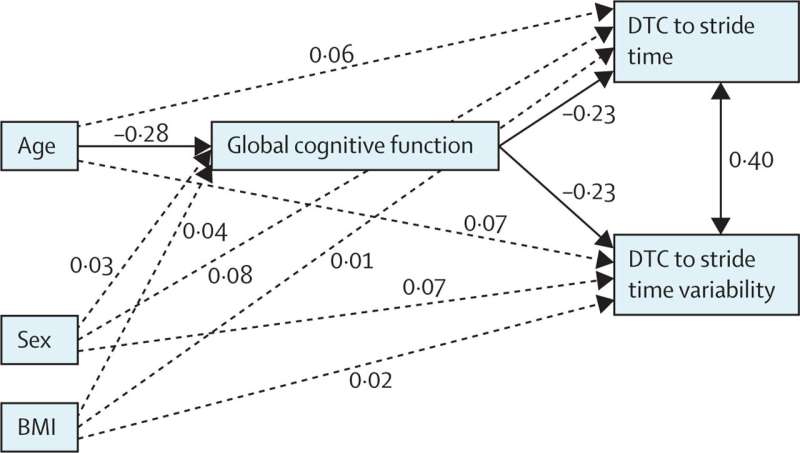This article has been reviewed according to Science X's editorial process and policies. Editors have highlighted the following attributes while ensuring the content's credibility:
fact-checked
proofread
Dual-task walking performance may be an early indicator of accelerated brain aging

Walking is a complex task that is most commonly performed while completing other tasks like talking, reading signs, or making decisions. For most, after the age of 65, such "dual tasking" worsens walking performance and may even cause unsteadiness. Intriguingly, older adults that are more affected by dual tasking are at higher risk of suffering adverse health outcomes, including both falls and dementia.
A new research study published in The Lancet Healthy Longevity has reported that the ability to dual task when walking starts to decline by the age of 55, up to a decade before 'old age' as traditionally defined by the threshold of 65 years. What's more, this decline in the ability to walk and talk at the same time was found to be caused not by changes in physical function, but instead by changes in cognition and underlying brain function.
"Our results suggest that in middle age, poor dual task walking performance might be an indicator of accelerated brain aging or an otherwise pre-symptomatic neurodegenerative condition," said primary co-author Junhong Zhou, Ph.D., Assistant Scientist I, Hinda and Arthur Marcus Institute for Aging Research.
"We assessed a large number of individuals between the ages of 40 and 64 years who are part of a study called the Barcelona Brain Health Initiative (BBHI). We observed that the ability to walk under normal, quiet conditions remained relatively stable across this age range. However, even in this relatively healthy cohort, when we asked participants to walk and at the same time perform a mental arithmetic task, we were able to observe subtle yet important changes in gait starting in the middle of the sixth decade of life."
"This means that a simple test of dual task walking, which probes the brain's ability to perform two tasks at the same time, can uncover early, age-related changes in brain function that may signify an increased risk of developing dementia in later life," said Zhou.
The paper stemmed from a unique collaboration between researchers at the Hinda and Arthur Marcus Institute at Hebrew SeniorLife in Boston and the Guttmann Institut in Barcelona, Spain, where the population-based Barcelona Brain Health Initiative (BBHI) is being conducted. The Principal Investigator of the BBHI is Prof. David Batres-Faz from the University of Barcelona, and Dr. Alvaro Pascual-Leone, the medical director of the Deanna and Sidney Wolk Center for Memory Health, and a Senior Scientist at Hinda and Arthur Marcus Institute for Aging Research at Hebrew SeniorLife, and who serves as Scientific Director of the BBHI.
"As compared to walking quietly, walking under dual task conditions adds stress to the motor control system because the two tasks (walking and mental arithmetic, for example) must compete for shared resources in the brain. What we believe is that the ability to handle this stress and adequately maintain performance in both tasks is a critical brain function that tends to be diminished in older age. Our study is important because it has discovered that changes in this type of brain resilience occur much earlier than previously believed," said Zhou.
"Now, we have a clearer picture of age-related changes in the control of walking and how this relates to cognitive and brain health," said Zhou. "Importantly though, while we observed that dual task walking tended to diminish with advancing age across the entire cohort, not everyone in the study fit into this description."
"For example, we observed that a portion of participants over the age of 60 years who performed the dual task test as well as participants aged 50, or even younger. This means that dual task walking performance does not necessarily decline as we get older, and, that some individuals appear more resistant to the effects of aging. We hope that our study will spur future research attempts to discover lifestyle and other modifiable factors that support the maintenance of dual task performance into old age, as well as interventions that target these factors."
Findings
996 people were recruited to the BBHI study between May 5, 2018, and July 7, 2020, of which 640 participants completed gait and cognitive assessments during this time (mean 24 days [SD 34] between first and second visit) and were included in the analysis (342 men and 298 women). Non-linear associations were observed between age and dual-task performance.
Starting at 54 years, the DTC to stride time (β=0·27 [95% CI 0·11 to 0·36]; p<0·0001) and stride time variability (0·24 [0·08 to 0·32]; p=0·0006) increased with advancing age. In individuals aged 54 years or older, decreased global cognitive function correlated with increased DTC to stride time (β=–0·27 [–0·38 to –0·11]; p=0·0006) and increased DTC to stride time variability (β=–0·19 [–0·28 to –0·08]; p=0·0002).
More information: Junhong Zhou et al, The age-related contribution of cognitive function to dual-task gait in middle-aged adults in Spain: observations from a population-based study, The Lancet Healthy Longevity (2023). DOI: 10.1016/S2666-7568(23)00009-0


















